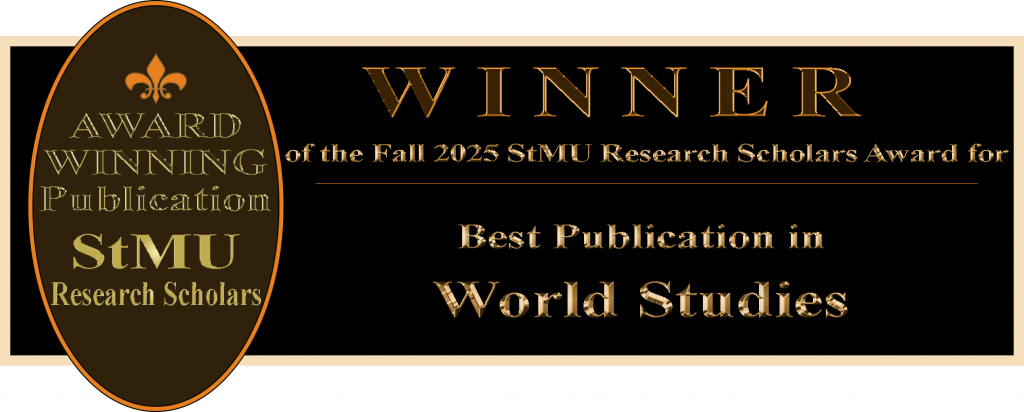
The story begins quietly, with a voice in the dark. Abraham is an elderly man who is surrounded by the peace of his promises kept, as he lived his days. His son Isaac is growing up and becoming stronger. For decades, Abraham has walked a long road of faith.1 He left his homeland, crossed deserts, and trusted a voice that often spoke more in silence rather than words. He was promised a son by the same God who had urged him to gaze at the stars.
But one night, with faint stars above, gentle wind brushing the tent, the same voice calls out again. It sounds calm, steady, and familiar, but what is asked deeply challenges Abraham’s faith.2 The voice says, “Abraham,” and he replies, “Here I am.” These simple words show his devotion and mark the start of the test.
This is not a vision nor a dream, but a command.3 The command comes suddenly without warning or reason. Abraham hears a voice telling him to take his son, his only son, and travel to the land of Moriah. There, he is told to offer Isaac as a burnt sacrifice on a mountain.
Abraham sits in the darkness listening to his heartbeat, seeming to be louder than the wind outside. He tries to make sense of the command; the son he was promised is now being asked for as a sacrifice. The God who gave him life now wants it back. Abraham does not argue or cry; the story never tells us how he feels, only saying he listens. In the quiet, his silence takes the place of his words.4
Dawn of Obedience
Abraham’s test begins in silence. 5 The text opens quickly: “After these things, God tested Abraham.” There is no explanation or emotional cues, only God’s voice instructing Abraham to take Isaac to the land of Moriah and offer him there.6 Abraham gets up before dawn. The air is cool, and the stars are still out as night fades. He quietly splits wood, saddles the donkey, gathers supplies, and gently wakes Isaac. Sarah is not mentioned, and the story suggests she does not know what is happening. Each detail shows Abraham facing the test alone, carrying the weight of both fear and faith.
When Abraham looks at his sleeping son, he feels the weight of what he has been asked to do. The story is powerful because of what it does not say. We do not know Abraham’s thoughts.7 We only know that he obeys. His silence is a key part of his faith, making him both mysterious and relatable. He does not argue, but his obedience is not easy; it is full of struggle and pain.
The Covenant Remembered
As Abraham sets out, the journey becomes as much internal as physical. He retraces his faith history with every step.8 He remembers the delight when Isaac was born, the laughter Sarah had when she had first learned she would have a child, and the evenings when God promised offspring as countless as the stars. Every promise that had given him hope now feels like a burden he can hardly handle.
In early Jewish interpretation, this recollection is essential.9 The rabbis taught that Abraham’s test could not be understood apart from his past faith, which is proven only in memory. The command to sacrifice Isaac was not a random cruelty but a confrontation with the deepest foundation of his trust. Would he believe in the covenant even when it seemed to self-destruct? Would he still trust the giver when the gift was demanded back?
The journey itself becomes an allegory of moral endurance. Abraham walks not through the wilderness alone, but through his conscience. His silence is not emptiness but concentration, a spiritual discipline that holds together the fragments of his fear and hope.10 Faith here is not certain; it is fidelity in confusion.
The Journey to Moriah
After two days of travel, the landscape shifts. The desert widens, the horizon grows distant, and the road becomes steeper. Abraham, Isaac, and two servants move slowly, the donkey laden with wood.11 The silence between father and son grows thicker. At times, Abraham glances at Isaac, the boy’s face full of youthful calm, unaware of the weight he carries.
Ancient commentators imagined this journey as three days of unspoken prayer. Each night, Abraham lay awake beneath the stars, asking whether he had heard correctly. Perhaps he wondered whether God, who had once promised life, could now demand death. Yet by morning, he continued. His obedience is not automatic; it’s a choice he makes every day through faith.12
On the third day, Abraham looks up and sees Moriah in the distance. The mountain stands not just as a place, but as a symbol of where faith and reason meet. Here he tells the servants, “Stay here with the donkey; the boy and I will go there to worship, and we will return.”13 His words, born of faith of denial, hold a quiet hope that God, who gives life, will somehow preserve it.
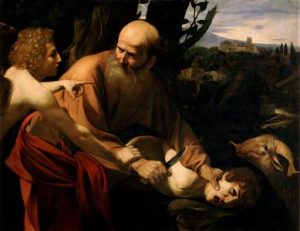
Isaac’s Question
Isaac carries the wood on his back as they climb the mountain. The image is striking, the son bearing the instrument of his own sacrifice. The fire and knife remain in Abraham’s hands, symbols of divine authority and human choice. Finally, Isaac breaks the silence. “Father,” he says,” We have the fire and wood, but where is the lamb for the offering?”14
The Question lingers. Abraham replies, “God will provide the lamb, my son,” both a declaration of faith and a desperate hope.15 In this exchange, early Jewish interpreters saw the heart of the Akedah as the merging of innocence and trust. Isaac’s question is not rebellion; it’s an understanding. Abraham’s answer is not deception but surrender, an acknowledgment that faith must sometimes walk without knowing. Abraham’s words contained both love and anguish. He believes, but belief costs him.
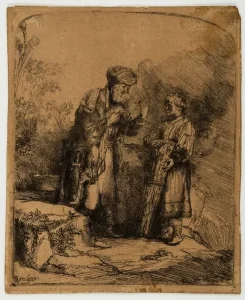
The Moment on the Mount
The top of Moriah is empty, windy, and bare, so quiet that every heartbeat is loud.16 Abraham carefully builds the altar, placing each stone slowly and deliberately. Each gesture seems to resist the purpose it serves. The act of preparing the altar, binding the wood, and arranging the fire becomes a ritual of grief disguised as obedience.
Isaac stands nearby, perhaps watching in uneasy stillness. 17 The early text reveals nothing about Isaac’s thoughts; we only see his body, calm and still, allowing itself to be bound. Some imagine his eyes steady with trust, an echo of his father’s faith, while others picture a sudden widening with fear, his silence trembling with shock. With either vision, the moment hangs heavy, filled with tension.
Abraham lifts the knife. 18 The text gives us no flourish, no divine thunder, only the stillness of decision. Around them, the wind pauses. Every heartbeat feels like an echo, waiting to see what faith would demand. Abraham’s faith wasn’t cold obedience; it was agony turned into trust. Beneath the surface, he was breaking.
For a moment, it feels like time has stopped. The knife flashes, Isaac’s breathing quickens, and then a voice cuts through the stillness. “Abraham, Abraham!”19 The name being called twice pulled him back from the edge. “Don’t touch the boy, or do anything to him. I can see now that you truly fear God.”
In that instant, everything changes.20 The test shows itself not as cruelty, but as mercy. Abraham’s obedience was real, God’s command to take a life. It was meant to show where faith and compassion meet.

The Descent from Moriah
Abraham and Isaac moved slowly down the mountain, the ram following closely behind. They stepped carefully over the rough, sharp stones. The wind moved through the few trees, bringing a hint of silence that remained at the top. Isaac’s shoulders were straightened, but his eyes held the memory of what had almost happened. Abraham glanced at him from time to time, searching for signs of fear, understanding, or relief, but only found quiet vigilance.21
The mountain receded behind them, its shadow stretching across the desert floor.22 Abraham’s hands were no longer trembling, but his chest still carried the weight of the morning. The air was thick with dust, wood, and a hint of ram. As the sun angle lowered, the view was brushed lightly with amber and gold. Silence wrapped around them, broken only by the rustle and the thud of footsteps on the stone.
The Quiet Journey
The path grew easier as they left the heights behind. Abraham’s mind wandered, though he did not speak. He remembered Isaac’s small hands, his trusting eyes, the knife’s near fall, the sudden call that had stopped him.23 Isaac walked beside him, quiet but steady, sometimes glancing at the ram or looking out at the horizon. The animals and the two figures moved as one, their steps shaped by the quiet that followed what had happened.
Time passed slowly, marked by changing light and moving shadows.24 Every gust of wind, every small sound in the desert, reminded them that the mountain still waited behind, holding the memory of fear, obedience, and mercy. Abraham’s chest rose and fell with careful attention, recalling the knife and the ram with every heartbeat.
Weight of Silence
Isaac did not speak. His silence carried many unspoken thoughts and feelings, wonder, relief, and a hint of fear. Abraham did not interrupt. He kept his own thoughts to himself, letting the quiet stretch between them.25
The ram wandered beside them, free but watchful, its presence a gentle reminder that life had been spared.26 Abraham walked down the mountain, but his heart remained high, where the air had been thin, and every heartbeat had counted. The path twisted and sloped, but neither father nor son rushed. The journey became a slow return to the ordinary world, yet everything they passed was now tangled with the memory of the extraordinary.
Faith in Motion
The mountain grew smaller as they walked away, and the wind became a gentle whisper over the desert. Abraham’s hands were steady, his shoulders lighter, yet the memory of the knife and the thicketed ram lingered. Isaac’s eyes held quiet trust, a mirror of the trembling faith that had carried them both through the test.27 They walked together, step by careful step, through the dust and sunlight, leaving the mountain behind but carrying the silence and weight of their journey.
Although no words were exchanged, the experience was deeply understood. The morning had demanded faith and endurance, and the day ended in quiet return. The desert spread out around them, open and unbroken, reflecting the vulnerability and strength of the human heart.28 In that silence, the story lived, not as a lesson or sermon, but as a journey felt, a test endured, and a bond preserved.
- Genesis 12:1-4. ↵
- Bereshit Rabbah, trans. H. Freedman and M. Simon (London: Soncino Press, 1939), 56:4. ↵
- Genesis 22:2. ↵
- Genesis 22:3. ↵
- Genesis 22:1-2. ↵
- Genesis 22:3. ↵
- Søren Kierkegaard, Fear and Trembling, trans. Alastair Hannay (London: Penguin Books, 1985), 57. ↵
- Genesis 15:5, 17:16-19. ↵
- Bereshit Rabbah, trans. H. Freedman and M. Simon (London: Soncino Press, 1939), 56:8-11. ↵
- Søren Kierkegaard, Fear and Trembling, trans. Alastair Hannay (London: Penguin Books, 1985), 57. ↵
- Robert Alter, The Hebrew Bible: A Translation with Commentary (New York: W. W. Norton & Company, 2019), 57. ↵
- Susan Niditch, “Abraham and Sarah: Promise and Fulfillment,” in Ethics in the Hebrew Bible (Cambridge University Press,1992), 23-25. ↵
- Søren Kierkegaard, Fear and Trembling, trans. Alastair Hannay (London: Penguin Books, 1985), 54. ↵
- Robert Alter, The Hebrew Bible: A Translation with Commentary (New York: W. W. Norton & Company, 2019), 58-63. ↵
- Bereshit Rabbah, trans. H. Freedman and M. Simon (London: Soncino Press, 1939), 56:8-10. ↵
- Robert Alter, The Hebrew Bible: A Translation with Commentary (New York: W. W. Norton & Company, 2019), 59. ↵
- Robert Alter, The Hebrew Bible: A Translation with Commentary (New York: W. W. Norton & Company, 2019), 60. ↵
- Robert Alter, The Hebrew Bible: A Translation with Commentary (New York: W. W. Norton & Company, 2019), 61. ↵
- Robert Alter, The Hebrew Bible: A Translation with Commentary (New York: W. W. Norton & Company, 2019), 62. ↵
- Søren Kierkegaard, Fear and Trembling, trans. Alastair Hannay (London: Penguin Books, 1985), 62. ↵
- Robert Alter, The Hebrew Bible: A Translation with Commentary (New York: W. W. Norton & Company, 2019), 63. ↵
- Bereshit Rabbah, trans. H. Freedman and M. Simon (London: Soncino Press, 1939), 56:10. ↵
- Genesis 22:19. ↵
- Bereshit Rabbah, trans. H. Freedman and M. Simon (London: Socino Press, 1939), 56:10. ↵
- Bereshit Rabbah, trans. H. Freedman and M. Simon (London: Socino Press, 1939), 56:7. ↵
- Robert Alter, The Hebrew Bible: A Translation with Commentary (New York: W. W. Norton & Company, 2019), 63. ↵
- Genesis 22:19. ↵
- Bereshit Rabbah, trans. H. Freedman and M. Simon (London: Socino Press, 1939), 56:11. ↵
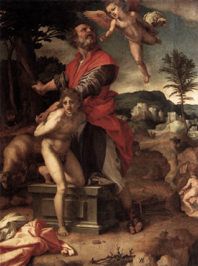

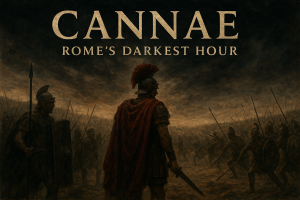

1 comment
Carlotta Portilla
It’s really interesting to see this story be examined in a more in depth way than before.